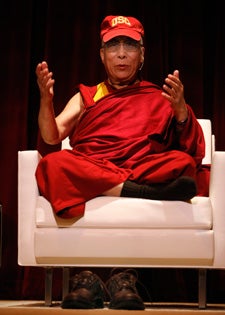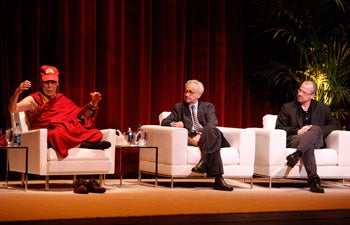A Visit to Cherish
Happiness — the basic human goal — depends upon good ethical conduct, regardless of one’s religious beliefs, said the 14th Dalai Lama during his first visit to USC on Tuesday.
“An open heart helps us become aware of our potential,” His Holiness told 4,800 people at the Galen Center then later more than 1,200 at Bovard Auditorium. Most attending were students.
“An open heart knows no fear. Has no jealousy or hatred.”
Wearing a traditional Tibetan robe — which happens to be the USC colors cardinal and gold — the Dalai Lama elicited loud cheers from both crowds when he donned a USC cap.
“We’re truly grateful to host this historic event,” said Varun Soni, dean of the USC Office of Religious Life, referring to the USC Student Interfaith Council, which organized the visit under the auspices of his office.
“Not only do we share His Holiness’ core values of service and engagement, we also share the same colors.”
Due to illness, the Dalai Lama had been forced to cancel appearances in Long Beach on Sunday and at UCLA on Monday. At one point during his two-hour discussion at Bovard, he pulled from his robe a pill bottle and took medicine, but appeared to be in fine form. He kicked off his shoes and made himself comfortable sitting cross-legged on a chair.

His Holiness dons a USC cap during his first visit to USC on May 3. Photo by Steve Cohn.
The Buddhist leader emphasized a moral framework based on universal rather than religious principles. Called secular ethics, it is a philosophy encouraging people to think for themselves and have genuine concern for their fellow human beings. It differs from religious ethics, which holds that people must do the right thing or be punished by God.
The Dalai Lama said he is a devout Buddhist and respects religion. But, he cautioned, the danger is to become attached to religion.
“Attachment to anything is bad,” he said. “You are your own master.”
At Bovard, the Dalai Lama joined a panel of world-renowned scholars: Antonio Damasio, University Professor, David Dornsife Professor of Neuroscience and director of the USC Brain and Creativity Institute; Gideon Yaffe, professor of philosophy and law in USC Dornsife; Duncan Williams, Shinjo Ito Distinguished Chair in Japanese Buddhism at the University of California, Berkeley who will be teaching at USC in the Fall; and Jonathan Haidt, professor of psychology at the University of Virginia.

Antonio Damasio and Gideon Yaffe of USC Dornsife listen to the Dalai Lama as the Nobel Peace Prize winner elaborates on his views during a panel discussion about secular ethics at Bovard Auditorium. Photo by Steve Cohn.
The moderator was Pico Iyer, journalist and author of a recent biography of the Dalai Lama.
Iyer pointed out that 23 years ago, Damasio participated in a similar panel discussion with the Dalai Lama in California — the same year His Holiness won the Nobel Peace Prize.
“So, Dr. Damasio is a good luck charm,” Iyer said.
During the discussion, the Dalai Lama implied that love and compassion are natural instincts. For example, he said, mothers typically instinctively nurture their offspring.
“In some cases mothers are consciously thinking about how their children’s lives might be connected to their welfare down the line so they must take care of their children,” the Dalai Lama said. “But in most cases it’s an instinctive response to take care of her child.”
Damasio noted that animals exhibit the same behavior. When a prairie dog has pups, for instance, both the mother and father will care for the litter. The mother and father mate for life.
“The behavior is entirely related to the release of oxytocin,” Damasio said. “If you block the gene that’s in charge of the release of oxytocin, all of this behavior stops. They don’t mate for life and they don’t take care of their offspring.
“But we as humans have the possibility of reflecting on the moral issues, recognizing it and structuring it for the greater good.”
The brain, Damasio said, plays a part in ethical and moral behavior. He has spent much of his career working with patients rendered entirely emotionless due to frontal lobe brain damage. Those with frontal lobe damage cannot obey social rules. But ethics is part biological and part cultural, he said.
“Ethics is not just about what comes naturally from our genes and our biology, it is also what cultural humans are able to create,” Damasio said.
At one point in the scientific discussion, the Dalai Lama, who often spoke in Tibetan and had an interpreter translating, touched his heart.
“Morals, ethics and the sense of caring — it all starts here.”
He always returned to compassion and kindness. Earlier at the Galen Center, he was asked about people celebrating the recent killing of Al Qaeda leader Osama bin Laden.
“Where does compassion and ethics fit into that?” asked moderator James Doty, clinical professor of neurosurgery at Stanford University, chairman of the Dalai Lama Foundation and a board member of the USC Brain and Creativity Institute.
“There must be a distinction between actor and action,” the Dalai Lama said. “Bin Laden was a force of destruction so his action needed justice. But as a human being we must have compassion. He committed a destructive action so actions had to be taken to stop it.”
Forgiveness doesn’t mean to forget what happened, he said.
“Remember what they have done,” he said. “Look at what they have done and determine what the appropriate action will have to be. But always have compassion.”
Read more about how the Dalai Lama inspired USC Dornsife students.